
HOMO-JOURNAL OF COMPARATIVE HUMAN BIOLOGY
Scope & Guideline
Pioneering Studies in Comparative Human Sciences
Introduction
Aims and Scopes
- Human Morphology and Anatomy:
The journal publishes studies that investigate human skeletal features, dental characteristics, and overall anatomy, often utilizing advanced imaging techniques and statistical methods. - Comparative Analysis of Populations:
Research often involves comparative studies across different populations, examining variations in biological traits and their implications for understanding human evolution and adaptation. - Interdisciplinary Approaches:
The journal encourages the integration of methodologies from various fields, including bioarchaeology, anthropology, and biostatistics, to enrich the understanding of human biology. - Health and Disease Patterns:
Papers frequently explore the relationship between biological traits and health outcomes, including studies on disability, chronic conditions, and their historical contexts. - Evolutionary Perspectives:
The journal emphasizes the evolutionary aspects of human biology, including studies that link contemporary findings to prehistoric human populations and their lifestyles.
Trending and Emerging
- Health and Longevity Research:
Recent studies have increasingly focused on the relationship between biological factors and health outcomes, particularly in aging populations, highlighting the importance of understanding longevity in various contexts. - 3D Imaging and Morphometrics:
The use of advanced 3D imaging techniques and geometric morphometrics is on the rise, allowing for more precise and detailed analyses of skeletal structures and their variations across populations. - Impact of Diet on Biological Traits:
Research examining the links between dietary practices and physiological traits, such as dental wear and fat distribution, is gaining traction, underscoring the role of nutrition in human biology. - Integrative Studies of Mobility and Subsistence Patterns:
There is a growing interest in understanding how mobility and subsistence strategies impact human health and skeletal development, particularly in archaeological contexts. - Prenatal and Early Life Influences on Health:
Emerging studies are focusing on the effects of prenatal stress and early life conditions on long-term health outcomes, emphasizing the importance of early interventions in public health.
Declining or Waning
- Traditional Osteology:
There has been a noticeable decrease in traditional osteological studies that focus solely on skeletal remains without integrating broader biological or environmental contexts. - Static Morphometric Studies:
Research that primarily employs static measurements of skeletal features without considering dynamic or functional aspects has become less common, as newer methods emphasize more holistic approaches. - Historical Bioarchaeology:
While still relevant, the focus on purely historical bioarchaeological studies is waning, possibly due to a shift towards contemporary applications and interdisciplinary research that includes modern population studies. - Single-Factor Analyses:
Studies that analyze human biology based on a single variable or factor are becoming less frequent, as researchers increasingly recognize the complexity of biological traits and their interactions.
Similar Journals
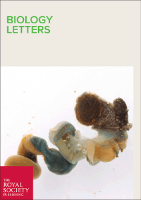
Biology Letters
Innovating the intersection of biology and interdisciplinary research.Biology Letters, published by the esteemed Royal Society, stands at the forefront of research in the field of biological sciences, with a strong emphasis on innovative studies that bridge gaps across disciplines. Since its inception in 2005, the journal has garnered significant recognition, achieving a remarkable Q1 ranking in Agricultural and Biological Sciences (miscellaneous) and a percentile of 88th in the same category, according to Scopus rankings. Released in the United Kingdom, the journal offers a platform for authors to share concise research findings and theoretical perspectives that contribute meaningfully to the advancement of biological inquiry. Although not open access, the journal remains highly regarded in the academic community for its rigorous peer-review process and impactful content, making it an invaluable resource for researchers, professionals, and students dedicated to exploring the complexities of biology. With an ongoing commitment to excellence, Biology Letters continues to shape the future of biological sciences.
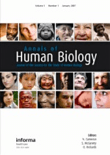
ANNALS OF HUMAN BIOLOGY
Unraveling the Complexities of Human BiologyANNALS OF HUMAN BIOLOGY is a distinguished academic journal published by Taylor & Francis Ltd that focuses on the intersection of human biology and health sciences. With an ISSN of 0301-4460 and an E-ISSN of 1464-5033, this journal has been a pivotal resource for researchers and practitioners since its inception in 1974. Covering critical domains such as Aging, Epidemiology, Genetics, Physiology, and Public Health, it exemplifies an interdisciplinary approach that enhances our understanding of human biological variation and its implications for health and disease. While it currently does not offer Open Access, the journal maintains a respectable standing in its field with notable rankings in Scopus, reflecting its contributions to scientific knowledge. Its commitment to high-quality research and comprehensive review makes it an essential platform for scholars, healthcare professionals, and students seeking to explore the biological underpinnings of human health.
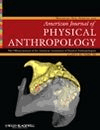
AMERICAN JOURNAL OF PHYSICAL ANTHROPOLOGY
Pioneering Research on Human VariationAMERICAN JOURNAL OF PHYSICAL ANTHROPOLOGY, published by Wiley, has established itself as a leading platform in the field of physical anthropology since its inception in 1918. This esteemed journal, identifiable by its ISSN 0002-9483 and E-ISSN 1096-8644, has been instrumental in disseminating groundbreaking research, achieving impressive rankings in both Social Sciences (Rank #18/443, 96th percentile) and Medicine (Rank #9/44, 80th percentile) categories within Scopus. Although its coverage in Scopus has concluded as of 2021, the journal continues to be a vital resource for academics and professionals seeking to explore the biological aspects of human evolution and variation. With a commitment to high-quality, peer-reviewed publications, the journal supports open access to enhance the visibility and accessibility of anthropological research globally. Researchers, students, and professionals are encouraged to engage with the innovative findings published in this journal, contributing to the ongoing dialogue in physical anthropology.
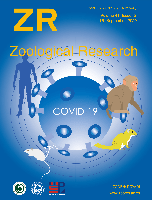
ZOOLOGICAL RESEARCH
Empowering Researchers with Unrestricted Access to KnowledgeZoological Research, published by Science Press, stands as a premier open-access journal in the fields of animal science, zoology, and ecology. Since its inception in 1980, it has fostered an inclusive platform for innovative research and dialogue within the scientific community, enabling researchers from across the globe to share their findings and insights. The journal's significant impact is underscored by its classification in the Q1 quartile across multiple categories, including Animal Science and Zoology, Ecology, and Nature Conservation for 2023, as well as its impressive rankings within Scopus, placing it in the top tier of its respective fields. Situated in Beijing, China, Zoological Research not only contributes to advancing knowledge but also emphasizes the critical importance of conservation practices in today’s rapidly changing ecosystems. With its commitment to open access, researchers, educators, and students alike benefit from immediate, unrestricted access to vital scientific information, making it an essential resource for anyone involved in the biological sciences.

Journal of Language Evolution
Unraveling the Mysteries of Language EvolutionThe Journal of Language Evolution, published by Oxford University Press, serves as a vital resource in the intersection of linguistics, psychology, and neuroscience. With an ISSN of 2058-4571, this prestigious journal has established itself as a prominent platform for innovative research since its inception in 2016, converging valuable insights up to 2023. It boasts notable rankings, including Q1 in Linguistics and Language and Q2 in both Developmental and Educational Psychology and Developmental Neuroscience, reflecting its high impact and relevance in the academic community. The journal is indexed in Scopus, where it ranks in the 93rd percentile for Linguistics and Language, showcasing its influence among leading scholars. Researchers, professionals, and students will find the journal’s rigorous analysis and interdisciplinary approach essential for advancing their understanding of language evolution and its broader implications. Although access is limited, the journal’s commitment to excellence positions it as a must-read for those engaged in these dynamic fields.

ZOOMORPHOLOGY
Transforming our understanding of zoological evolution.ZOOMORPHOLOGY, published by SPRINGER, stands as a pivotal journal in the fields of Animal Science, Zoology, and Developmental Biology. Since its inception in 1980, this journal has been dedicated to advancing the understanding of animal morphology and the evolutionary adaptations of various species. With an ISSN of 0720-213X and an E-ISSN of 1432-234X, ZOOMORPHOLOGY boasts a Q2 ranking in Animal Science and Zoology and is recognized within the Q4 category in Developmental Biology as of 2023, reflecting its impactful contributions to the scientific community. The journal is indexed in Scopus, where it ranks #224 out of 490 in Animal Science and Zoology, and #66 out of 82 in Developmental Biology, positioning it as a resource of considerable significance for researchers and professionals in these disciplines. Although ZOOMORPHOLOGY currently operates on a traditional access model, it continues to foster scholarly communication and inspire future researchers through rigorous peer-reviewed articles that explore the intricate relationships between form and function in the animal kingdom. With a commitment to excellence and innovation, ZOOMORPHOLOGY remains a vital platform for publishing high-quality research that drives forward our knowledge in morphology and evolutionary biology.

PRIMATES
Connecting researchers and enthusiasts in the study of primates.PRIMATES is a distinguished academic journal dedicated to advancing the field of primatology, published by SPRINGER JAPAN KK. Since its inception in 1957, the journal has served as a vital platform for researchers, professionals, and students passionate about the study of primates, their behavior, biology, and conservation. With a robust publication history extending to 2024 and a current ranking in the Q2 category of Animal Science and Zoology according to Scopus, PRIMATES promotes high-quality research that enhances our understanding of these remarkable species. The journal does not offer open access, ensuring that each article is meticulously curated for its discerning audience, who seek to stay informed of the latest findings and methodologies in primate research. The journal is based in Japan and continues to play an important role in the global scientific community, providing significant contributions to both the academic literature and conservation efforts surrounding primate species.

Anthropologie-International Journal of Human Diversity and Evolution
Navigating the Richness of Human ExperienceAnthropologie-International Journal of Human Diversity and Evolution is a prominent peer-reviewed journal published by the esteemed MORAVIAN MUSEUM in the heart of the Czech Republic. With a focus on anthropology, this journal serves as a vital platform for the dissemination of innovative research that explores human diversity and evolutionary studies. The journal operates under a rigorous academic framework and is categorized in the Q3 quartile for anthropology in 2023, reflecting its significance in the field. Although it does not currently offer open access options, Anthropologie facilitates the exchange of knowledge through its carefully curated articles spanning diverse topics within human evolution. Its Scopus ranking (320 out of 502 in social sciences) underscores its role as a relevant source for scholars and professionals alike, fostering dialogue and advancements in understanding human diversity. Researchers, students, and practitioners can look forward to engaging content that not only enlightens but also inspires further inquiry into anthropological studies.
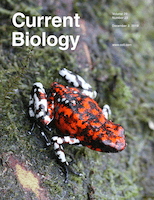
CURRENT BIOLOGY
Where Cutting-Edge Research Meets Practical ApplicationCURRENT BIOLOGY is a premier academic journal published by CELL PRESS, dedicated to a broad spectrum of fields within biological sciences. With an ISSN of 0960-9822 and E-ISSN 1879-0445, the journal has established itself as a vital resource for groundbreaking research and advancements since its inception in 1991. CURRENT BIOLOGY boasts high prominence in its categories, securing a Q1 quartile ranking in Agricultural and Biological Sciences, Biochemistry, Genetics and Molecular Biology, and Neuroscience, indicating its significant impact and relevance in these fields. Notably, it ranks #9 out of 221 journals in Agricultural and Biological Sciences, placing it in the 96th percentile, while also maintaining a strong presence in the Biochemistry category with a rank of #26. Researchers and professionals can rely on CURRENT BIOLOGY for comprehensive reviews, innovative methodologies, and crucial scientific developments that bridge theoretical knowledge with practical applications. The journal continues to play an essential role in enhancing the global dialogue in biological research, making it indispensable for students, academics, and industry experts aiming to stay at the forefront of the rapidly evolving landscape of life sciences.

JOURNAL OF EVOLUTIONARY BIOCHEMISTRY AND PHYSIOLOGY
Decoding the Evolutionary Threads of Biochemical ProcessesJOURNAL OF EVOLUTIONARY BIOCHEMISTRY AND PHYSIOLOGY, published by PLEIADES PUBLISHING INC, is a pivotal periodical that delves into the intricate relationships between biochemical processes and evolutionary dynamics. With its ISSN 0022-0930 and E-ISSN 1608-3202, this journal serves as a comprehensive platform for researchers, professionals, and students dedicated to understanding the physiological adaptations and biochemical mechanisms influenced by evolutionary pressures. Although it is not an open access journal, it offers valuable insights across its historically significant coverage spanning from 1972 to 2017, making it an essential resource for those working in agricultural, biological, and molecular sciences. Despite its current Scopus rankings revealing limited visibility within its fields, the journal remains committed to fostering scholarly dialogue and advancing knowledge in the realm of evolutionary biochemistry, especially for those exploring the ecological, genetic, and integrative physiological aspects of life.